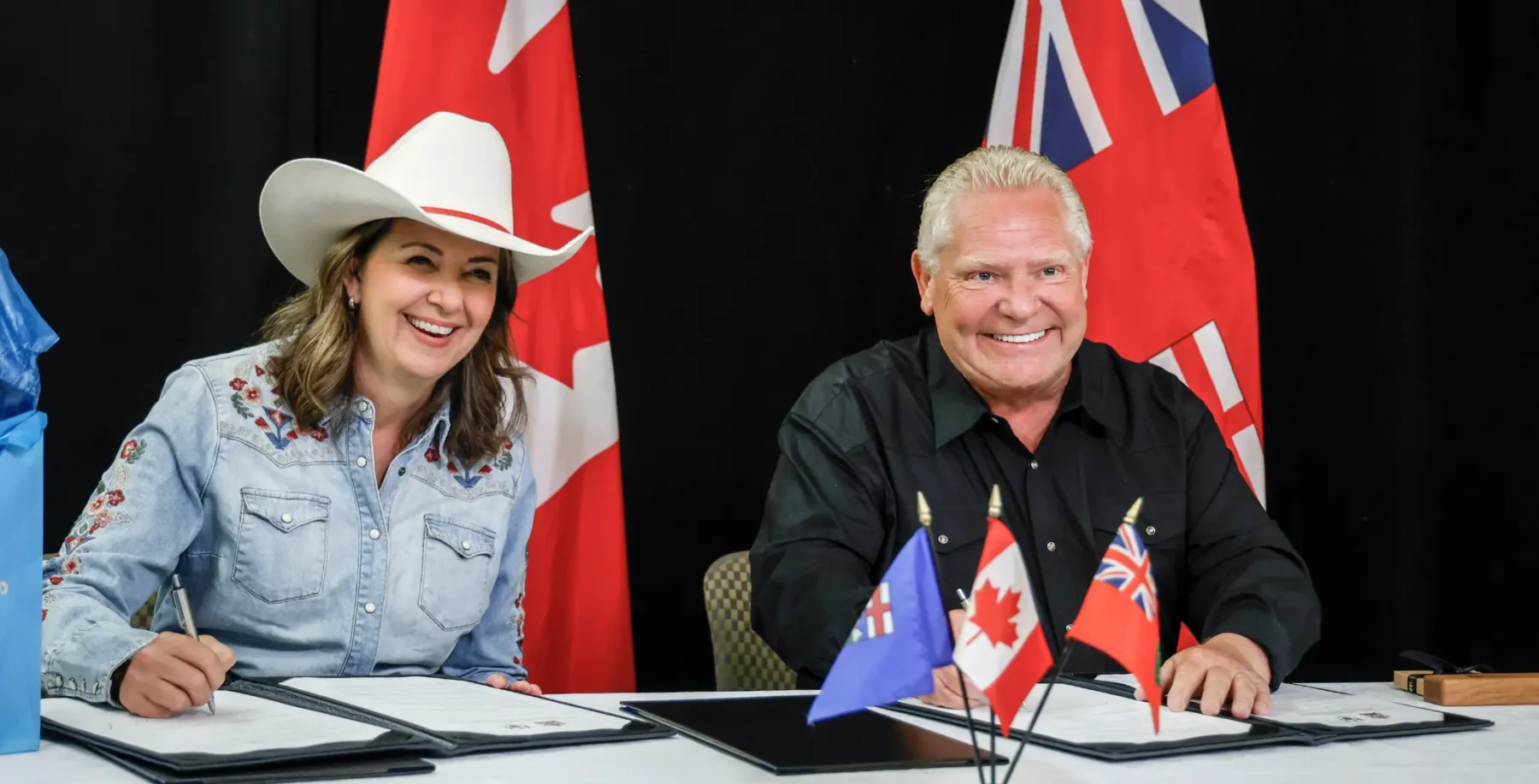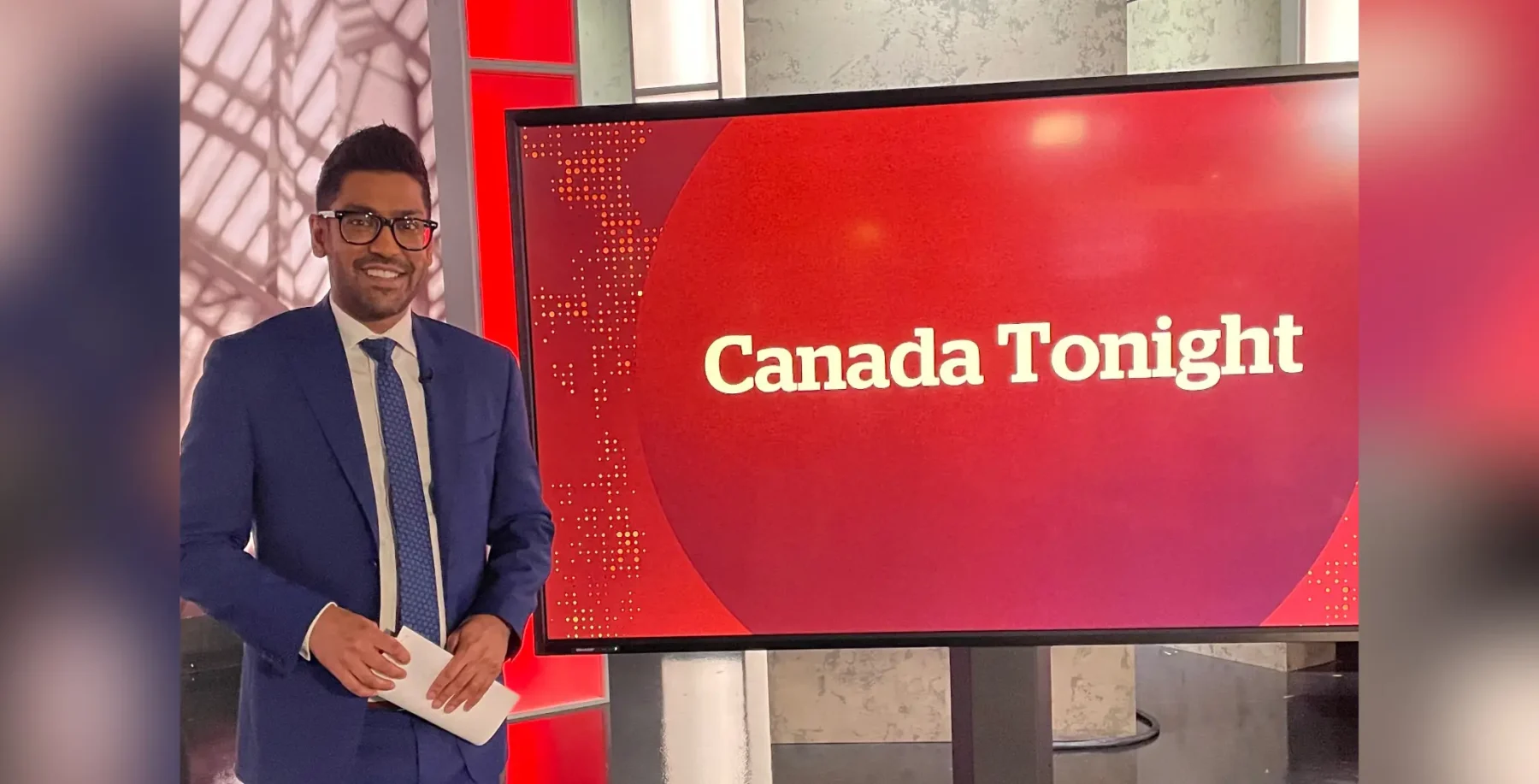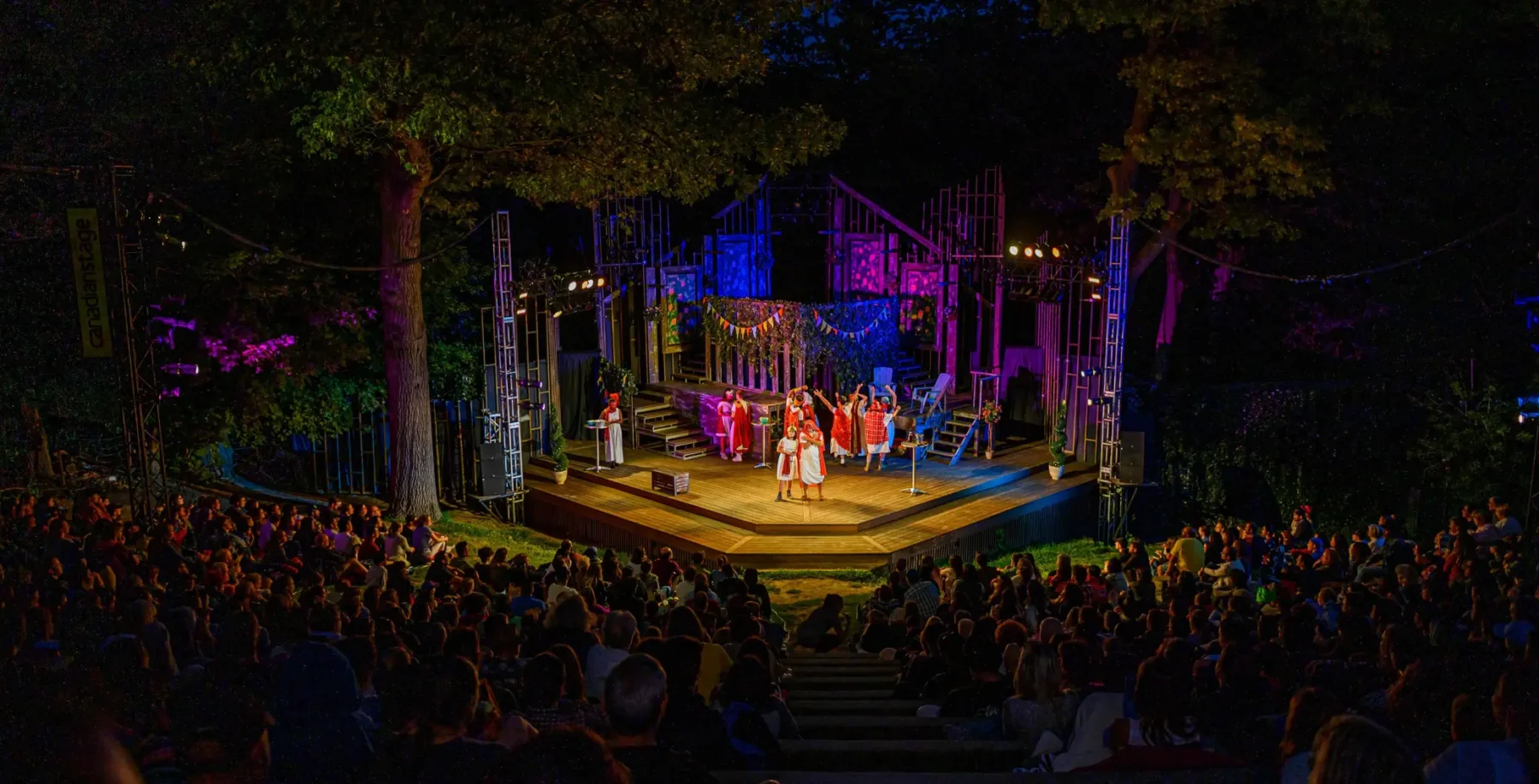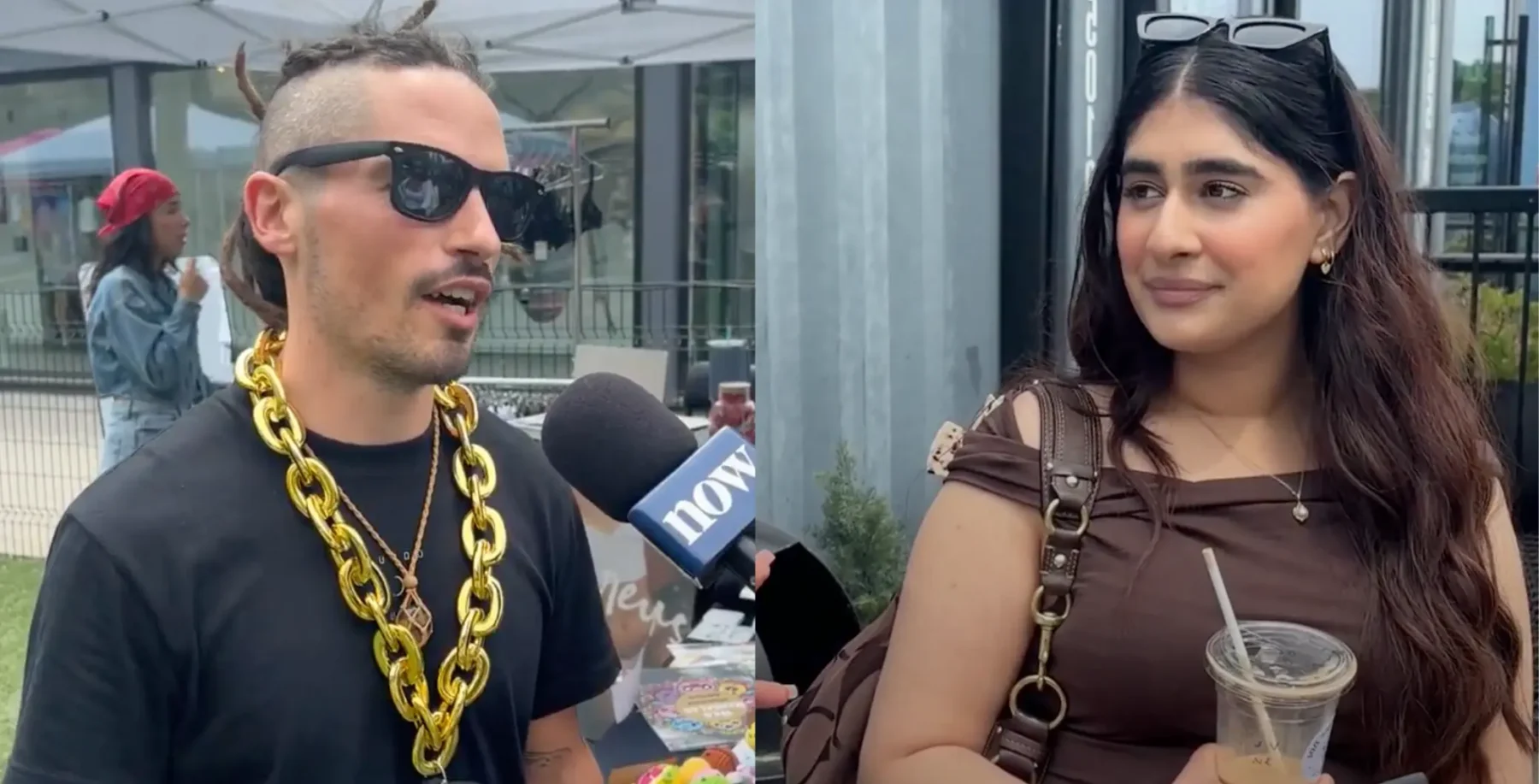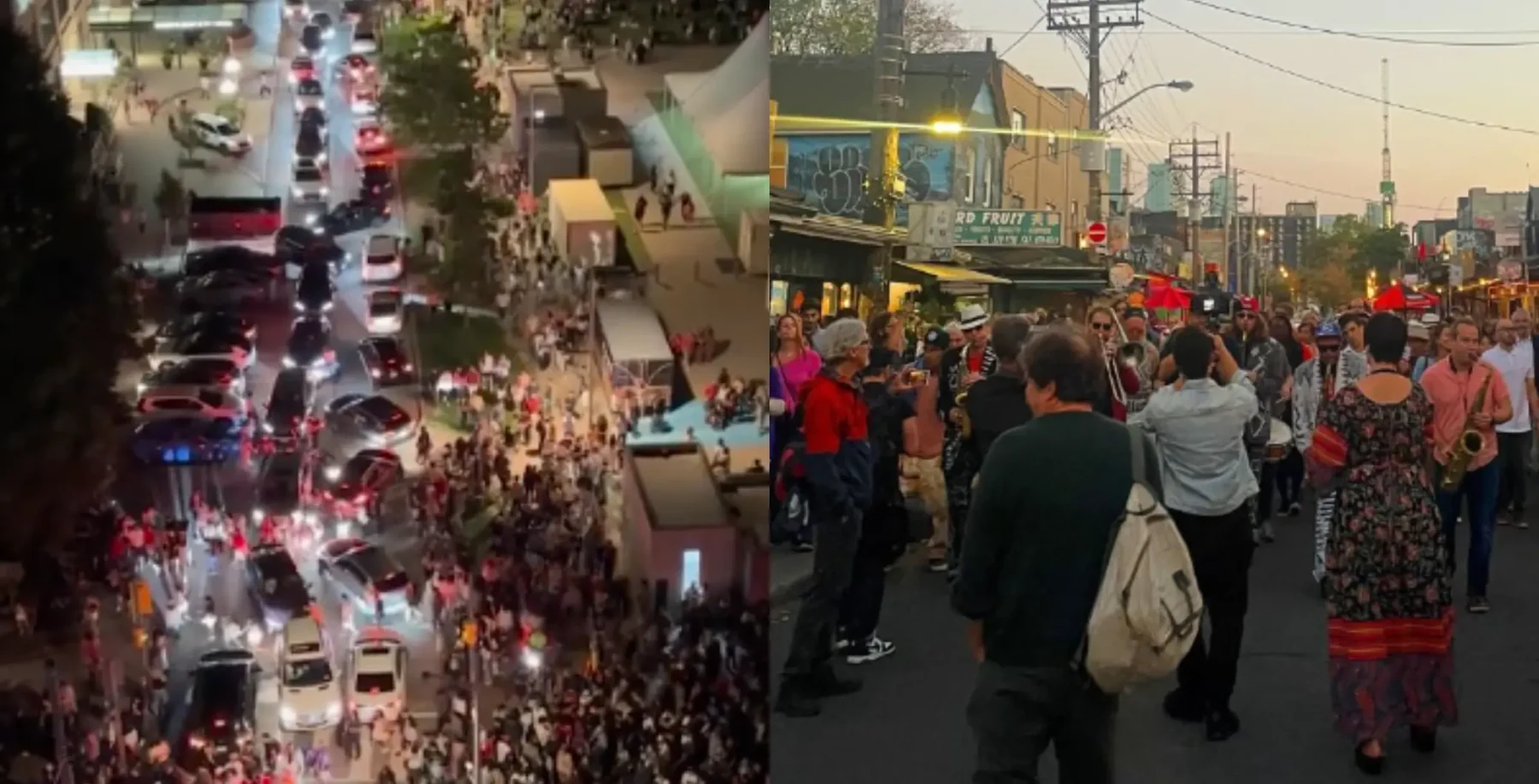
Rating: NNNNN
parry sound — rain is pelting down on my windshield as I weave north on a Georgian Bay-side highway that’s been blasted through the Canadian Shield.This thrust through layer after layer of Precambrian rock is so labour-intensive that the four-laning of highway 69 is costing the Ontario government in the neighbourhood of $200 million. One stretch near Parry Sound alone cost over $5 million a kilometre.
Don’t get me wrong. The exit off the highway into Parry Sound is a pleasure to drive — silky smooth asphalt, precise grading and soft shoulders. The Tories and local leaders around these parts believe this grand, if overpriced, piece of engineering is their ticket to prosperity. Build it and the businesses will come.
The familiar and irritating sign at side of highway 69 reminding you that these are your tax dollars at work may have Mike Harris’s name on it. But ask anybody in Parry Sound and they’ll tell you this is Ernie Eves’s road.
While the former Tory finance minister and deputy premier was spouting fiscal conservatism to the rest of the province, he was doling out the largesse to his hometown. Despite the Common Sense Revolution, Parry Sound is still very much a welfare state, thanks to Eves. Twenty years after he stepped into the political ring, the town is stuck in the same problematic economy it faced when the ambitious high school senior first arrived.
Opening the government purse is the least he could do for the the picturesque though depressed summer tourist town Eves once called home. After all, this is the place that fuelled his opportunism and provided the setting for the streak of fortune and finagling that launched his heady career on a razor-thin six-vote margin.
Eves heads into the Tory leadership convention this weekend ready for a cliff-hanger showdown with Jim Flaherty, hoping to walk out the premier. Will slick Ernie continue the ascension he so slyly crafted back on Main Street? Or will the former treasurer who presided over mass layoffs, squeezed social services and touted the virtues of self-reliance as children went hungry find that old Parry Sound luck starting to wane?***
Despite Eves’s vows from the start of his political career to tackle unemployment in his riding, little has changed around these parts. Young people still have to go south to find work and build a life. And many of those who stay in town are stuck in low-paying seasonal jobs — some call it serfdom to the rich cottage owners.”We clean septics, we plow their lanes in the winter,” says Richard Thomas, who has run as a Liberal and Green candidate against Eves in the past. “Absolutely nothing Ernie did addressed that problem.”
Eves may have positioned himself as a champion of lower taxes and the free market, but Parry Sound is still dependent on big government.
Sure, the local school board was amalgamated with North Bay’s, the local jail’s been shut down, and there are no more Ministry of Labour or Ministry of Environment inspectors based in town. But Parry Sound’s status, however debatable, as a northern Ontario community, which Eves championed, means it gets more money from practically every ministry.
And while the Tories have closed hospitals and cut arts funding in southern Ontario, in Parry Sound they provided millions for a new hospital as well as a new performing arts centre and the new Bobby Orr Hockey Hall of Fame on the waterfront.
Then there’s that highway expansion. So far, the pristine roadway has had mixed results for the local economy. The construction project itself has created a mini-boom. Parry Sound had an accommodation shortage last summer at the peak of the tourist season, because the hotels were filled with highway workers.
Ted Knight, the mayor who left Parry Sound in 1974 and came back in 1997, is pinning his hopes for future generations on the highway. But even he has his reservations. “Long-term, I don’t know how it’s going to work out,” he admits in between bites of a smoked meat sandwich in a small mom-and-pop restaurant.
Whether more asphalt will bring riches is one thing, but Knight also believes that Parry Sound won’t be able to develop successfully until the numerous local municipalities are brought together under one council. The town simply doesn’t have the tax base or the room to grow. If there was ever a case for amalgamation, the district of Parry Sound is it. There are more than a half-dozen local governments here, with no second tier for regional planning.
Eves forced amalgamation in Toronto to balance his books, but he waffled on the issue in his own riding. He’s on record supporting local amalgamation. But he also conveniently refused to force the issue and left it in the hands of local politicians — perfect if you want it to go nowhere fast.
“For him it was an easy way to go,” says Jim Hanna, editor of the Parry Sound North Star.
Perhaps most telling are the latest census numbers that show the town’s population dropped slightly from 6,326 in 1996 to 6,124 in 2001. Despite lavishing more government money and expensive projects on his hometown, in his 20 years Eves never cracked the nut when it came to the most basic of “common sense” promises — real jobs. ***
Job prospects didn’t seem to be Eves’s problem back in 1965, when he was in grade 13 and his parents moved to Parry Sound from Windsor after his father got a job as the manager in a local factory. The young Eves was already getting noticed. Former Parry Sound High School teacher and Liberal candidate Ed Fisher recalls him as an outgoing jock, setting a junior record for the mile run while in Windsor. It didn’t take long for Eves to set his sites on a woman richer by far than his own humble beginnings — Victoria Macklaim, the daughter of Royce Oscar Macklaim, who owned a construction firm and Tudhope Cartage, a lucrative local trucking business.
This was the fateful leg up that would help turn a bright young man into a social and political force. It may even have facilitated an expensive sojourn at the University of Toronto.
Eves fell hard, or so it appears. The entry beside his 1965 yearbook photo, right above Vicki’s photo, starts with the quote “If it be love indeed, tell me how much.” The two were married the next year, and Eves went to Toronto to pursue an undergraduate degree and eventually law at Osgoode Hall.
In the summers, he worked for another Windsor transplant, William Green, a staunch Liberal who had a general law practice in Parry Sound and would serve as Eves’s professional and political mentor. After Eves was called to the bar in 1972, he formed a partnership with Green.
While carefully putting down roots with the local Kinsmen and Big Brothers Association, Eves bolstered future political campaigns by tapping the in-law connection and becoming president and director of Tudhope Cartage. Suddenly, with one swoop, he had netted establishment connections — and a war chest.
By 1981, the 34-year-old Eves was ready to wade into the power game. So would begin his calculated manoeuvring into the public sphere. When Parry Sound’s long-time Tory MPP, Lorne Maeck, announced he was retiring, Eves decided to go for it. For the nomination, Eves went up against Norm Mason, a vice-principal and then the reeve of nearby Burks Falls.
Mason had a higher profile. But Eves, already wily, managed to gain an edge by having the nomination meeting held in his old high school gymnasium. Over a thousand raucous party members were bused in for the February 1981 meeting.
But what happened then was the first of two white-knuckle wins that still cause some bitterness locally. Eves, who even then campaigned on promoting local industry so young people wouldn’t have to leave to find work, beat Mason on the first ballot by a mere 21 votes.
Over 20 years later, I catch up with the now retired Mason chopping wood at home in Burks Falls. He’s philosophical about the divergent paths he and Ernie took after 1981 and concedes that Ernie was probably the better person. He wonders how a political career where he was away in Toronto for long periods would have altered his own life.
“It’s the kind of lifestyle that wasn’t good for a family,” Mason says.
Despite the loss, Mason continued to support Eves. In the general election that followed in March 1981, Eves went up against a quirky environmentalist from Kearney who was running on the Liberal ticket.
Richard Thomas had been a radio show host in Toronto in the late 1950s and had done some advertising work. He was a gifted and passionate public speaker, with a soft baritone voice.
In the winter of 1981, as he was poised to campaign against Eves, he was also facing a federal charge for possessing a still. The RCMP had raided his farm on a tip five months earlier.
Thomas had been distilling pure alcohol from Jerusalem artichokes he grew on his farm. He had converted an the engine of an old Volvo and was driving it around the area with a sign in the window declaring “This car runs on straight alcohol.”
Around the time Eves won the Tory nomination, Thomas, already the Liberal candidate, went to trial in a Parry Sound courtroom. According to an article in the local paper, the “special prosecutor” brought in to argue the case against Thomas was William Green.
Officials at the courthouse tell me it wasn’t unheard of for the Crown’s office to pay local lawyers to argue cases if they were short-staffed. Green, Eves’s mentor and partner, passed away in 1997. In the end, the charge against Thomas was dropped. But he had taken on the persona of a righteous maverick, and rode the notoriety into the March election.
On election night, tensions ran high at Eves headquarters as the returns started to come in. They were running neck-in-neck with Thomas.
In the end, the final vote count showed Eves ahead by a slim 10 votes. A judicial recount would whittle that margin down to six.
Dubbed “Landslide Ernie,” Eves had squeaked in.
But the Eves win has never sat well with local Liberals. To this day, rumours abound about the voting. Asked whether he was satisfied with the ballot count, Thomas says he would “rather not discuss that.”
But Ed Fisher, who ran the Thomas campaign, says he was “not satisfied” with the count. Fisher notes that only votes cast were counted and that “illegal votes are not considered.”
Did they have reason to believe illegal votes were cast? I ask. “We feel we did,” is all Fisher will say.
Thomas would take on Eves later as a Liberal and then as a Green candidate, but he never came close to upsetting him again.
“I despise the man as a politician, as a servant of the people,” says Thomas. ***
For years, Eves and his wife made a point of making appearances at as many local events as possible. But when the Harris Tories took power in 1995, that all began to change.”We knew that we were going to lose him,” says Tim West, president of the Muskoka-Parry Sound Tory riding association and a loyal Eves supporter for two decades. “He admitted the fact that he was going to have to be down in Toronto.” The death of Eves’s son Justin in the fall of 1995 also “made it awkward coming home,” West adds.
But it was the messy divorce and Eves’s new society-page lifestyle that caused locals to feel uneasy about their man at Queen’s Park for the first time. Vicki was active in the community in her own right and had also acted as Eves’s proxy at official functions when he couldn’t attend.
“Vicki’s a hometown girl, so it’s hard to see what’s been happening to her,” says Tim Dunn, who owns the local A&P and is president of the Liberal riding association.
During the 1999 campaign, Eves spent more time wooing votes in Muskoka, which had been tacked onto his riding when the Tories decided to mirror federal electoral boundaries, than he did in Parry Sound.
“In 99 the people (in Muskoka) had to get to know him during the whole campaign phase,” says West. “They see him lots over there, but we don’t see him as much.”
It had become so “awkward” by the winter of 2001 that it was clear Eves had no intention of returning home at all. The deputy premier finally resigned his government seat for a senior post at Credit Suisse First Boston.
But timing and smelling power have always been Eves’s best skills. Soon after Mike Harris announced he was retiring, Eves jumped back into the game he had seemed so tired of less than a year earlier to seek the party leadership.
What lured Eves back? Was it that with Isabel Bassett on his arm he had another well-connected partner to see him through to the next level? Or perhaps Eves saw the economic downturn and the inevitable restructuring that has shaken CSFB lately and wanted to get out on his own terms.
Although Eves has kept a low profile in Parry Sound throughout the campaign, West still expects the former deputy premier to walk into the convention with over 90 per cent of the town’s Tory support.
Says West, “They’re putting their personal feelings aside about the relationship with the family, and they’re saying we know who he is and what he wants to accomplish.” scottand@nowtoronto.com

